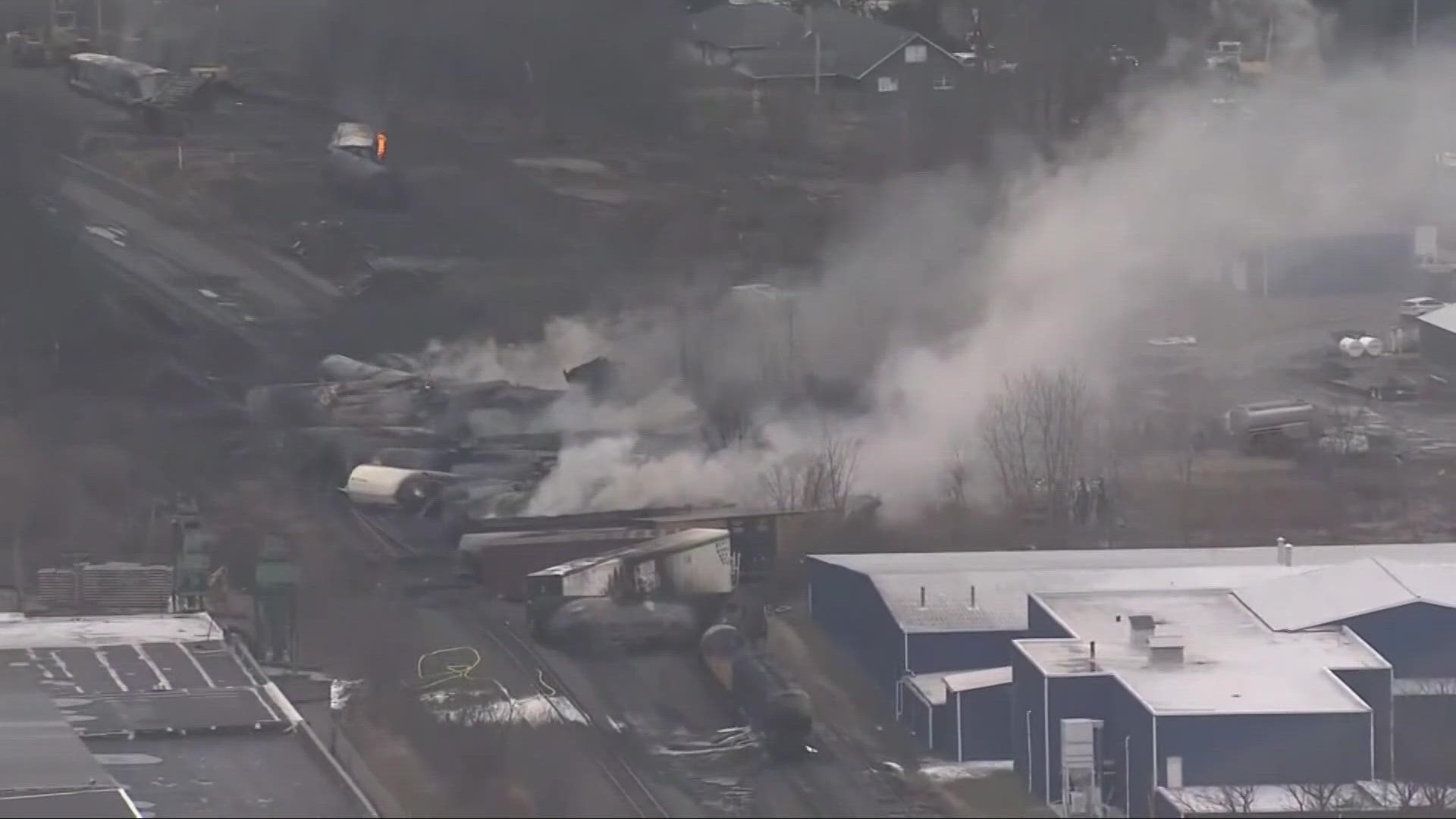WASHINGTON — The National Transportation Safety Board released its preliminary report Thursday amid the ongoing investigation into the train derailment that happened in East Palestine nearly three weeks ago on Feb. 3.
NTSB officials also hosted a news conference in connection with its preliminary report to "discuss factual information from the investigation and rail safety." NTSB Chair Jennifer Homendy and Robert J. Hall — director of the NTSB’s Office of Railroad, Pipeline and Hazardous Materials — both spoke at the press briefing.
"This was 100% preventable," Homendy told reporters. "We call things accidents; there is no accident. Every single event that we investigate is preventable."
According to the report, the 149-car train crashed because of a failed wheel bearing on the 23rd rail car. Records show the bearing had been overheating for about 30 miles before the wreck, but the crew was not alerted to stop the train until a tracker detecting the piece of equipment at more than 250 degrees Fahrenheit above normal temperature.
Per Norfolk Southern Railway policies, engineers must stop and inspect trains when a bearing reaches a temperature at least 170 degrees above normal, or when it's at least 115 degrees hotter than other bearings on the same axle. At greater than 200, the car must be removed from service.
The railroad has trackside hot bearing detectors located roughly 10-20 miles apart from one another, with the first about 30 miles northwest of East Palestine showing the bearing at 48 degrees above normal temperature (that number includes an addition of 10 degrees for the outside air). Ten miles later, the wheel's heat rose to 113 degrees above ambient, but this was still well below the threshold required to stop the train.
Finally, at milepost 49, the bearing was flagged at 263 degrees above an acceptable temperature, sending an alarm to the crew inside the lead locomotive. The NTSB says the engineer did indeed apply the breaks, but to no avail, as the axle broke and 38 of the cars derailed. Once the train came to a stop, the crew alerted authorities of a possible derailment and fire before moving the engines away from the scene.
"We have no evidence that the crew did anything wrong," Homendy declared.
Read the full preliminary report below:
Eleven of those cars were carrying hazardous materials, including five each with more than 115,000 gallons of vinyl chloride. After residents within a one-mile radius were evacuated, both Norfolk Southern and Ohio Gov. Mike DeWine decided the best option at that point was to conduct a "controlled release" of the chemicals, rather than risk a potentially more dangerous explosion.
"The temperature inside one of the tank cars was increasing, which could result in a catastrophic explosion," Homendy said. "The critical point is 180 degrees, and at the time, one of the cars was reading 140 degrees."
Other liquid chemicals spilled into local waterways, killing more than 38,000 fish. The board has not yet determined what caused the bearing to fail, with Homendy saying it could be anything from metal fatigue to loose bearings or wheel defects.
"It's absolutely critical for problems to be identified and addressed early so these aren't run until failure," Homendy said of wheel bearings.
U.S. Transportation Secretary Pete Buttigieg addressed the NTSB's investigation during his visit to East Palestine on Thursday.
“Their final work on this will take a while to come out, but having these factual findings is an important step toward being able to move on to the phase of policy making," he said during a late-morning press conference. "While we will, of course, wait for their analysis and recommendations at the end of the full process to make certain judgments, we will not wait for that process to run its course to continue doing everything that we can to raise the bar on rail safety and to hold people accountable.”
The full NTSB investigation is expected to take more than a year. In a statement released Thursday night, Norfolk Southern pledged to cooperate with the inquiry while also claiming its temperature thresholds for overheating and inspecting are "among the lowest in the rail industry."
"We and the rail industry need to learn as much as we can from this event," the company added. "Norfolk Southern will develop practices and invest in technologies that could help prevent an incident like this in the future."
A health clinic opened in East Palestine earlier this week for residents in the area amid ongoing concerns after the derailment and controlled release of chemicals.

